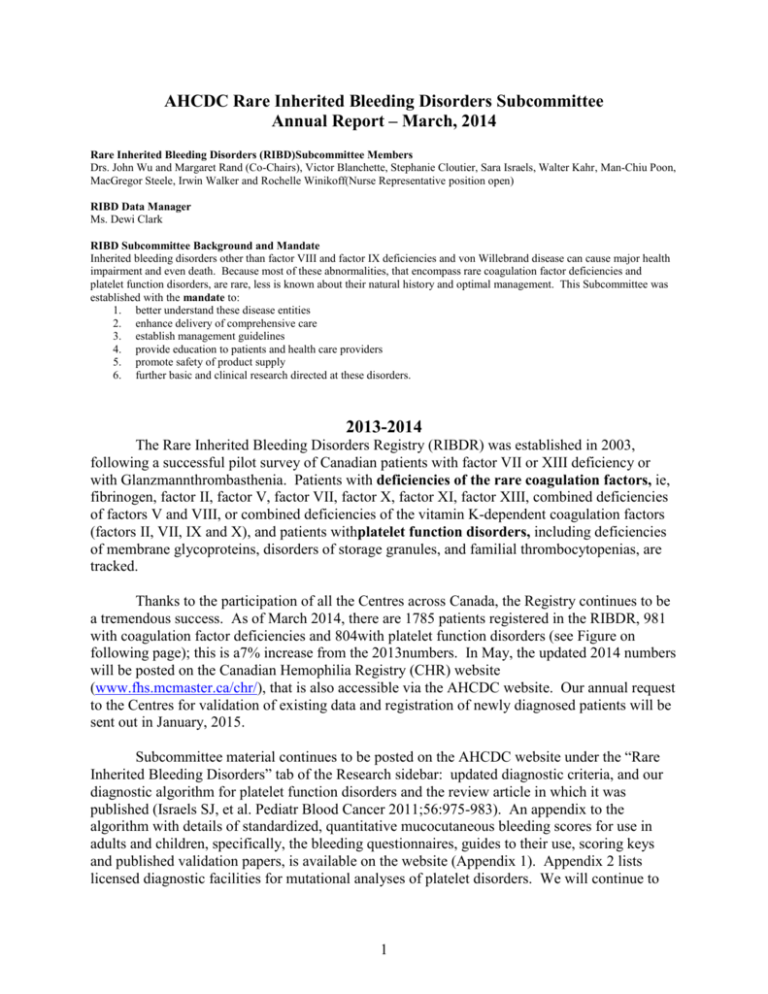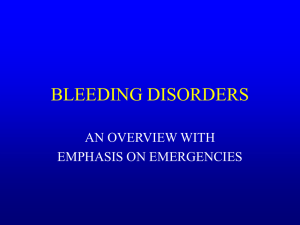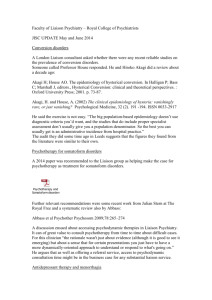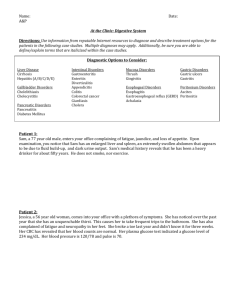Rare Inherited Bleeding Disorders Subcommittee Report 2014
advertisement

AHCDC Rare Inherited Bleeding Disorders Subcommittee Annual Report – March, 2014 Rare Inherited Bleeding Disorders (RIBD)Subcommittee Members Drs. John Wu and Margaret Rand (Co-Chairs), Victor Blanchette, Stephanie Cloutier, Sara Israels, Walter Kahr, Man-Chiu Poon, MacGregor Steele, Irwin Walker and Rochelle Winikoff(Nurse Representative position open) RIBD Data Manager Ms. Dewi Clark RIBD Subcommittee Background and Mandate Inherited bleeding disorders other than factor VIII and factor IX deficiencies and von Willebrand disease can cause major health impairment and even death. Because most of these abnormalities, that encompass rare coagulation factor deficiencies and platelet function disorders, are rare, less is known about their natural history and optimal management. This Subcommittee was established with the mandate to: 1. better understand these disease entities 2. enhance delivery of comprehensive care 3. establish management guidelines 4. provide education to patients and health care providers 5. promote safety of product supply 6. further basic and clinical research directed at these disorders. 2013-2014 The Rare Inherited Bleeding Disorders Registry (RIBDR) was established in 2003, following a successful pilot survey of Canadian patients with factor VII or XIII deficiency or with Glanzmannthrombasthenia. Patients with deficiencies of the rare coagulation factors, ie, fibrinogen, factor II, factor V, factor VII, factor X, factor XI, factor XIII, combined deficiencies of factors V and VIII, or combined deficiencies of the vitamin K-dependent coagulation factors (factors II, VII, IX and X), and patients withplatelet function disorders, including deficiencies of membrane glycoproteins, disorders of storage granules, and familial thrombocytopenias, are tracked. Thanks to the participation of all the Centres across Canada, the Registry continues to be a tremendous success. As of March 2014, there are 1785 patients registered in the RIBDR, 981 with coagulation factor deficiencies and 804with platelet function disorders (see Figure on following page); this is a7% increase from the 2013numbers. In May, the updated 2014 numbers will be posted on the Canadian Hemophilia Registry (CHR) website (www.fhs.mcmaster.ca/chr/), that is also accessible via the AHCDC website. Our annual request to the Centres for validation of existing data and registration of newly diagnosed patients will be sent out in January, 2015. Subcommittee material continues to be posted on the AHCDC website under the “Rare Inherited Bleeding Disorders” tab of the Research sidebar: updated diagnostic criteria, and our diagnostic algorithm for platelet function disorders and the review article in which it was published (Israels SJ, et al. Pediatr Blood Cancer 2011;56:975-983). An appendix to the algorithm with details of standardized, quantitative mucocutaneous bleeding scores for use in adults and children, specifically, the bleeding questionnaires, guides to their use, scoring keys and published validation papers, is available on the website (Appendix 1). Appendix 2 lists licensed diagnostic facilities for mutational analyses of platelet disorders. We will continue to 1 develop further appendices on, for example, blood films, platelet function testing, etc, as adjuncts to the algorithm. Also posted are the English 3rd edition and the newly completed French 3rdedition of “Disorders of Platelet Function. An Information Booklet for Patients, Families and Health Care Providers”, co-authored by Drs. Sara Israels, Man-Chiu Poon and Margaret Rand on behalf of the Canadian Pediatric Thrombosis and Hemostasis Network. With the recent availability of a new product for factor XIII deficiency, the time is right for an in-depth investigation of the large national cohort of factor XIII deficient patients. As a start to this, a Working Group was established and a survey conducted. The information on clinical manifestations, laboratory findings, and treatment that was collected on the 49 Canadian patients from 11 HTCs was summarized in an abstract that was accepted as a free paper oral presentation at the WFH World Congress in Melbourne in May, 2014. A study proposal is being developed to gain detailed insight into our unique national cohort. With the licensing of a fibrinogen concentrate and the post-licensure requirement, a retrospective Canadian multicenter study of the safety and efficacy of the concentrate for routine prophylaxis, treatment of bleeding and surgery is being initiated. Any individual with congenital fibrinogen deficiency who has received at least one dose of fibrinogen concentrate will be eligible. HTC directors of centers with such patients are being notified and encouraged to participate in this study. As in the past, our Canadian HTCs are uniquely suited for this endeavor which has the potential to generate exciting new knowledge in this area. *Factor VII and XIII deficient patients and patients with Glanzmannthrombasthenia only 2







